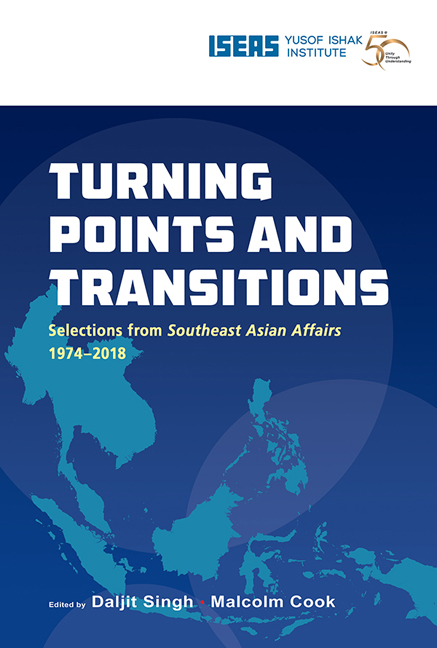Foreword
Published online by Cambridge University Press: 29 May 2019
Summary
For anybody working on Southeast Asia, the ISEAS – Yusof Ishak Institute (hereafter ISEAS) has been a “light on the hill”, a beacon of warm hospitality and serious scholarship for fifty years. ISEAS has quickly established itself as unquestionably the leading institution in the field, a great testimony to the vision of its founders and to the wonderful work of its staff, past and present.
In what is arguably its flagship publication, Southeast Asian Affairs (hereafter SEAA) has been published annually since 1974. Each year, the Southeast Asian community, both within and beyond the region, and from the academic, policy, media and NGO worlds, eagerly awaits the arrival of this volume.
The series has generally followed a winning formula that has clearly stood the test of time. There are general overviews of politics, international relations, economics and social affairs. Then follows detailed country surveys highlighting, interpreting and assessing recent developments. The guiding principle has been to invite scholars with a deep knowledge of the subject matter to write analytical yet accessible and concise papers looking backwards and forward.
Perusing the pages of the present volume — Turning Points and Transitions: Selections from Southeast Asian Affairs 1974–2018 — the reader is introduced to a veritable “who's who” of Southeast Asian Studies since the 1970s: Wang Gungwu, Chan Heng Chee, Michael Leifer, Rodolfo Severino, Sharon Siddique, Sjahrir, Suchit Bunbongkarn, and many, many others.
Appropriately, the editors have selected papers that call attention to key turning points and trends in the region. These are well reflected in some of the chapter titles: “the handling of contradictions”, “the ASEAN economic miracle unravels”, “from Bali to Iraq”, “Kampuchea 1979– 81”, “the fall of Soeharto and the rise of Habibie”, “what went wrong with the Thai democracy?”, among many other arresting titles.
The timing of this volume is propitious. It is an opportunity to celebrate ISEAS's fiftieth birthday, to showcase its unrivalled network of scholars and to reflect on the “journey” that the region has taken since 1974. Few if any regions of the world can match Southeast Asia for its dynamism, its diversity, its rising economic and political coherence, and its effective international engagement. All these dimensions are evident in this wide-ranging volume.
- Type
- Chapter
- Information
- Turning Points and TransitionsSelections from Southeast Asian Affairs 1974-2018, pp. xii - xiiiPublisher: ISEAS–Yusof Ishak InstitutePrint publication year: 2018

